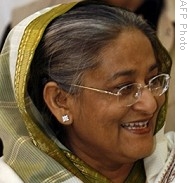-
(单词翻译:双击或拖选)
 |
| Former Bangladeshi Prime Minister and Awami League party leader Sheikh Hasina Wajed after casting her vote at a polling booth in Dhaka, 29 December 2008 |
Election officials say the Awami League overwhelmingly was the dominant3 party in the first parliamentary election here in seven years. The secular4, left-of-center party, led by Sheik Hasina, captured about 230 of the parliament's 300 seats. Allied5 parties won about another 30. The Awami League now has a mandate6 to push through constitutional changes and its sweeping7 reform manifesto8.
The election commission says a record 85 percent of eligible9 voters went to the polls.
The results are a crushing defeat for Hasina's long-time foe10, former prime minister Khaleda Zia, who allied with several other parties, including an Islamic fundamentalist group.
Zia's Bangladesh Nationalist Party is formally complaining that its supporters were kept from voting in various places.
Such allegations are not swaying the preliminary opinion of domestic and international observers that the election process, while not perfect, was conducted in a fair manner and free of the widespread vote-rigging typical of past elections.
 |
| Constance Berry Newman, leader of International Republican Institute observer delegation11, at Dhaka news conference |
Former U.S. assistant secretary of state for African Affairs, Constance Berry Newman, led the 65-person observer delegation of the International Republican Institute.
"Though observers noted12 many procedural irregularities they did not believe them of the scope and severity that would call into question the legitimacy13 of the process or the outcome," said Newman.
Despite the Awami League's overwhelming victory, Melbourne University (Australia) political science research fellow Syeed Ahamed says Sheik Hasina's party must give its arch-rival a role in parliamentary affairs.
 |
| Melbourne University research fellow Syeed Ahamed |
"Even if BNP has only some say 30 to 35 seats in the popular vote they actually present almost 50 percent of the population," said Ahamed. "That should be kept in mind. If Awami League do not put BNP in a significant position, what will happen if actually BNP resigns en masse from the parliament? It will be chaos14."
The two major rival parties traded power during a 15-year period that ended in 2006 with political violence on the streets spinning out of control. That compelled the military to intervene, installing a caretaker government.
The interim15 leaders vowed16 a crackdown on political corruption17, jailing hundreds of people, including Sheikh Hasina and Khaleda Zia. The two fierce rivals, known as the "Battling Begums" and heirs to political dynasties, were freed to contest the long-delayed election.
 收听单词发音
收听单词发音
1
legacy

|
|
| n.遗产,遗赠;先人(或过去)留下的东西 | |
参考例句: |
|
|
|
2
corrupt

|
|
| v.贿赂,收买;adj.腐败的,贪污的 | |
参考例句: |
|
|
|
3
dominant

|
|
| adj.支配的,统治的;占优势的;显性的;n.主因,要素,主要的人(或物);显性基因 | |
参考例句: |
|
|
|
4
secular

|
|
| n.牧师,凡人;adj.世俗的,现世的,不朽的 | |
参考例句: |
|
|
|
5
allied

|
|
| adj.协约国的;同盟国的 | |
参考例句: |
|
|
|
6
mandate

|
|
| n.托管地;命令,指示 | |
参考例句: |
|
|
|
7
sweeping

|
|
| adj.范围广大的,一扫无遗的 | |
参考例句: |
|
|
|
8
manifesto

|
|
| n.宣言,声明 | |
参考例句: |
|
|
|
9
eligible

|
|
| adj.有条件被选中的;(尤指婚姻等)合适(意)的 | |
参考例句: |
|
|
|
10
foe

|
|
| n.敌人,仇敌 | |
参考例句: |
|
|
|
11
delegation

|
|
| n.代表团;派遣 | |
参考例句: |
|
|
|
12
noted

|
|
| adj.著名的,知名的 | |
参考例句: |
|
|
|
13
legitimacy

|
|
| n.合法,正当 | |
参考例句: |
|
|
|
14
chaos

|
|
| n.混乱,无秩序 | |
参考例句: |
|
|
|
15
interim

|
|
| adj.暂时的,临时的;n.间歇,过渡期间 | |
参考例句: |
|
|
|
16
vowed

|
|
| 起誓,发誓(vow的过去式与过去分词形式) | |
参考例句: |
|
|
|
17
corruption

|
|
| n.腐败,堕落,贪污 | |
参考例句: |
|
|
|















